Let’s be honest: real estate is often hyped up as a sort of holy grail for making money.
That said, there’s no denying the potential earnings for agents.
For example, a ~5% commission on a $200,000 property is ~$10,000. When you’re juggling multiple clients as an agent and referrals start rolling in, your profits can add up quickly.
Consider that 5.34 million homes were sold in the United States last year. Coupled with the fact that Google searches for “should I buy a house” reached an all-time high in 2020, there’s definitely a window of opportunity for new agents right now.
And so if you’re interested in testing the waters of real estate, we totally get it.
In this guide, we’ll walk through the basics of what it takes to become a real estate agent including tactics, and tools for approaching real estate as a business owner.
- Why start a real estate agency now, though?
- What are the current market opportunities for real estate agents?
- What challenges do real estate agents face right now?
- What are the requirements for becoming a real estate agent?
- How do real estate agents generate leads and prospects?
- What tools do you need to start a real estate agency?
- Start your remote-ready business in 10 steps
- What skills and traits matter most to a real estate agent?
Why start a real estate agency now, though?
Hey, fair question.
Getting started in real estate can be daunting for beginners. Meanwhile, the uncertain economic climate might make it seem like now’s not really the ideal time to dive in.
However, the stats above and current housing trends actually say that’s not the case.
It’s cliche to say that now is the time to get into real estate, but let’s look at some of the reasons why you should consider starting your business ASAP.
The barrier to entry is low
Becoming a real estate agent is arguably easier than ever.
Requirements in terms of education, time, and price tag are practically nothing compared to the potential returns. For example, getting a real estate license can be done in a matter of months with little more than a high school diploma and some coursework.
The whole process can be navigated almost exclusively online, too. There are plenty of online real estate schools for prospective agents looking to pass their state exams.
In terms of actually being an agent, you don’t need to worry about a physical office space or pricey advertising. With well-placed online ads and the right tech tools (more on those later), you can get your real estate business up and running on a relatively small budget. Much like many jobs are going remote, so is real estate.
The process of buying and selling a home likewise happens largely online. As long as you have a web presence where leads and prospects can get in touch, you’re on the right track.
You can scale your business at your own pace
Being a real estate agent is hard work.
But despite popular belief, it doesn’t have to result in backbreaking, endless hours. It doesn’t have to mean quitting your day job, either.
The beauty of working in real estate is that you’re empowered to work as much (or as little) as you want. Like any other sort of business owner, you have control over your client load and the flexibility to scale at your own pace.
Consider that real estate side hustles are becoming increasingly popular, especially for folks trying to figure out whether they want to commit to being an agent long-term. Although you might be tempted to dive into real estate head first, taking a slow and steady approach is much less stressful and allows you to build sizable side income.
Agents are essentially always in-demand
Remember what we said earlier about 5+ million homes being sold within the past year? Although demand for agents is far from static, shifts in the market mean that there are opportunities for agents
Think about it. Booming economy? People are buying homes. Downturn? People are selling their homes.
In short, agents are necessary for helping people manage their largest economic investment.
What are the current market opportunities for real estate agents?
There are lots of opportunities out there for those looking to start a real estate agency. Below are two key points in the favor of new agents despite the tough times we’re facing.
The rise of remote work means more people can move more freely
Remote and hybrid work has given workers in a high cost of living area an incentive to live elsewhere for the sake of reducing their mortgages. Such areas will be selling en masse, and likewise areas with a lower cost of living could see a subsequent boom of buyers.
People moving period is good news for real estate agents. As more people shift around the country, they’ll need agents to hold their hands through the process of finding a new home.
The popularity of real estate investing signals the need for more agents
Fact: interest in real estate investing now outweighs that of the stock market.
Not only that, but a shocking 55% of millennials are interested in investing themselves. Younger buyers are currently flooding the market to purchase homes, with millennials now making up the largest share of homebuyers in the United States at 37%.
And although real estate has the connotation of a get-rich scheme, this is more so the case with investors versus agents.
That’s good news for you, though. As an agent, you’re a necessary piece of the puzzle for anyone looking to buy, sell, or flip a property. Agents benefit from the hype around investing without carrying around the risk.
What challenges do real estate agents face right now?
It’s crucial that agents keep themselves rooted in reality.
A strong economy obviously spells good news for the real estate market. Right now, the combination of COVID-19, rising rent costs, and general economic anxiety are weighing on the house-buying public.
Coupled with potential evictions and rising unemployment numbers, circumstances could clearly be better for newcomers to real estate.
And with roughly two million active real estate agents in the United States, competition is clearly an issue. More folks flocking to the field means that new agents have to step up their game to stand out from the crowd and grab the attention of new clients.
{Marketo-form}
What are the requirements for becoming a real estate agent?
Licensing requirements for starting a real estate agent or becoming an agent vary from state-to-state.
Some states stricter requirements in terms of coursework, while others have pricier exam fees. Below is a general overview of what’s required to get a real estate license in most states:
- ~40-60 credit hours of pre-licensing education and coursework (some states require longer and/or multiple courses)
- Passing your licensing exam (some states require a waiting period if you don’t pass the first time)
- Fingerprinting and a background check
- Completing your actual license application
- Paying to activate your license
Again, this is just a general overview to give you an idea of what legwork is involved. Make sure to double-check your respective requirements for your state prior to pursuing a license.
How do real estate agents generate leads and prospects?
Now, let’s talk about what being an agent or running an agent actually looks like in practice.
There is no single, silver-bullet approach to acquire clients. As noted earlier, the space is incredibly competitive.
That’s why it makes sense to do as much as you can to fill up your pipeline. As a beginner, you need to put out as many feelers as possible. Note that getting clients becomes much easier once you successfully close contracts and have some referrals under your belt.
But what if you’re just starting out? Here are a few ideas to help get your agency off the ground.
1. Build your network and connections (both online and off)
There are no two ways about it: you absolutely have to network.
If you sit around waiting for clients and leads to fall into your lap, you’re going to be sorely disappointed. Even talking to friends and family is a solid starting point to find potential opportunities in your network. Then, move onto coworkers and colleagues. You need an efficient prospecting plan to be successful.
From there, you can always reach out to players in the industry via phone, email, or social media. This includes people who work for mortgage firms, title companies, or even other real estate agents. Online communities, Facebook Groups, and platforms like LinkedIn are excellent for finding potential partnerships.
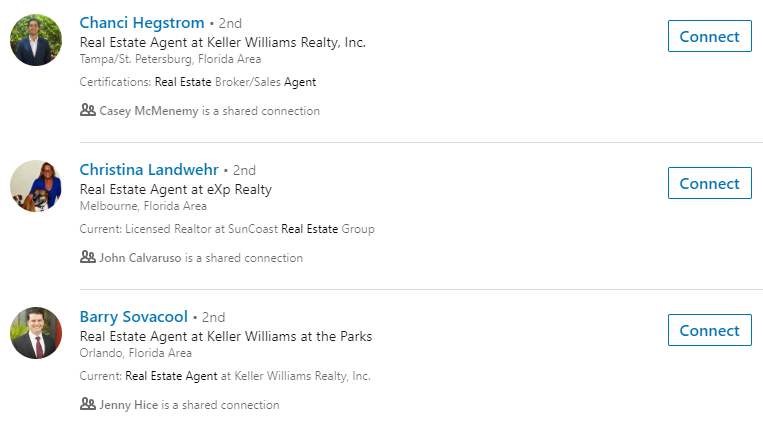
2. Run targeted online ads
Running ads might seem like a no-brainer.
But keep in mind that not all types of ads are equally effective. For example, it’s pretty common to see Google searches saturated with ad purchases from big-name realtors and companies.

Instead, it’s arguably more prudent for up-and-coming agencies to advertise on social media. Why? Because platforms like Facebook and Instagram allow you to target customers based on factors such as age, income, and location.
For example, you can run ads explicitly targeting people within a certain income bracket within a community: that means that you only reach relevant prospects and don’t waste money serving ads to users who’d never be interested.
There are tons of Facebook ad success stories for real estate companies out there (like the one below which resulted in a 4.6x increase in click-through rate). Running social ads requires some trial-and-error but is essential to so many real estate businesses getting off the ground.

3. Make yourself known on social media
Piggybacking on the last tip, having a social presence on Facebook, LinkedIn, and Instagram is a great way to uncover clients.
Fact: 77% of realtors use social in some capacity. It’s likewise the number one place where younger home buyers begin their search.
Comments and DMs on social media are a bit less “formal” than calls or outreach. They also take less time to craft. With a bit of creativity, you can show off properties and find potential buyers and sellers in your area.
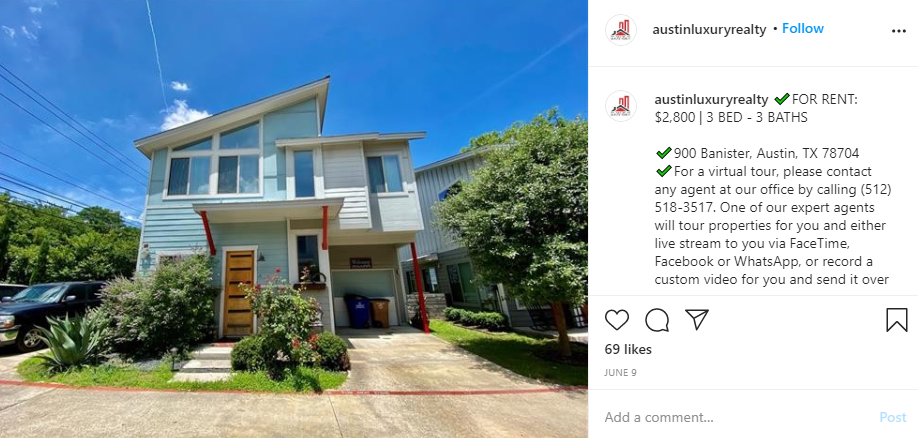
4. Uncover leads from expired FSBO (for sale by owner) listings
Cold-calling might not be sexy, but it’s much better than just expecting leads to find you at random.
Conducting outreach on expired listings is a tried-and-tested tactic for finding leads. Just take a peek at your local MLS listings, keep an eye on what’s about to expire, and conduct a cold call once the listing goes off the market.
Over time, you can craft your own cold calling scripts to streamline the process of prospecting.
5. Attend (and conduct) more open houses
Did you know that nearly 70% of agents have sold homes from connections they’ve made at open houses?

Attending and conducting open houses is a surefire way to find clients, build relationships, and become more comfortable approaching people in the field.
Although open houses might not be totally prudent in the wake of COVID-19, note that fully virtual open houses are on the rise. This again speaks to the need for agents to get on board with modern tech and social media.
6. Build a website that attracts clients
While social media is an awesome tool for your real estate agency, nothing beats having an actual website that you own.
Your website serves as the hub of your business. This is where prospects can get to know you and understand whether your personality and expertise is the right fit for them.
Some general tips for real estate agents looking to snag clients from their sites include:
- A sleek, responsive design that’s friendly to mobile and desktop users
- Intake forms to gather your clients’ essential information
- Contact options such as phone, email, video chat, or social media
- Client testimonials
- Blog posts and resources that attract traffic from search engines (think: optimizing your website for keywords like “[your city] real estate agent”

Gathering inbound traffic and leads from your site is a slow process that takes time. Either way, having a website is pretty much non-negotiable for real estate agents.
7. Purchase a lead list and start cold-calling
Let’s say you don’t have the time, patience, or energy to dig for cold-calling candidates.
Hey, no problem. There are plenty of services out there which aggregate and source prospects for your area (including FSBO leads), such as:
- Market Leader
- REDX
- BoldLeads
Again, anything you can do to take action and talk to more prospects is a point in your favor. Even if people from such lists are far from “sure things,” talking to them is a great way to hone your skills and better understand what people in your market are looking for from agents.
8. Join forces with your local chamber of commerce
If you want to connect with like-minded business owners, your local chamber of commerce is a good starting point. If nothing else, doing so signals that you’re serious about being part of your local business community. Even small talk can lead to an opportunity; the more people you talk to, the better.
What tools do you need to start a real estate agency?
Business owners are only as good as the tools in their toolbox.
There’s tons of software for real estate agents out there to help streamline the process of connecting with clients and organizing your business. Below we’ll look at some of the must-have tools that anyone running a real estate agency should be familiar with.
CRM
Think of your CRM as your business’ one-stop-shop for managing client relationships.
With a CRM, have a complete profile of each of your clients, leads, and prospects in one place. This includes records of their personal details, interactions (think: emails, phone calls), and documents such as contracts.
Logging interactions automatically with a CRM is a time-efficient alternative to keeping manual notes through spreadsheets. By having your clients’ information consolidated, it’s much easier to manage your priority tasks and keep your schedule from devolving into chaos.
When it comes to choosing a CRM system, there is no shortage of options. However, there are real-estate CRMs out there that are tailor-made for anyone running an agency. Tools like Contactually clearly highlight your client calendar, most recent communications.
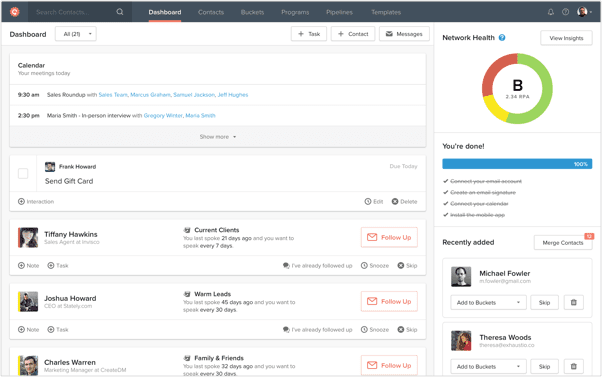
Specifically, the platform has built-in daily reminders for follow-ups so you never miss out on important messages.

CRMs make it easy to break down your client relationships and data. For example, the Freshsales dashboard allows you to see which of your real estate clients are most engaged with your messages.
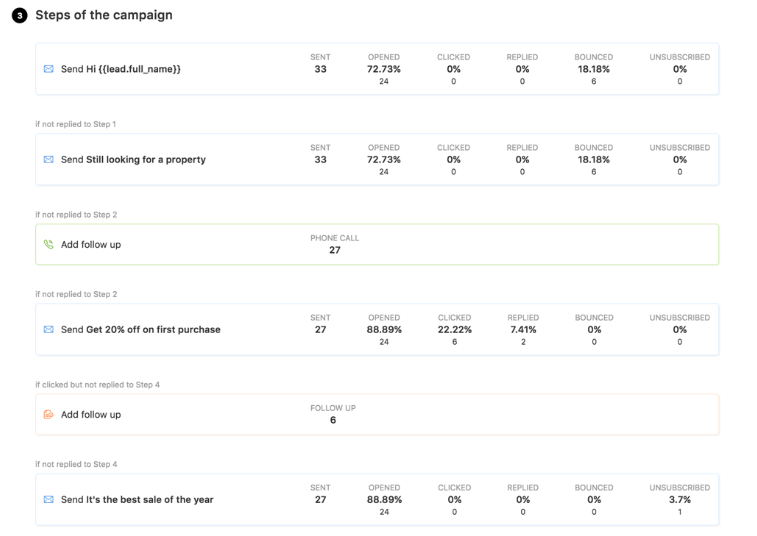
Additionally, Freshsales gives you a birds-eye view of your properties and listings in one place.
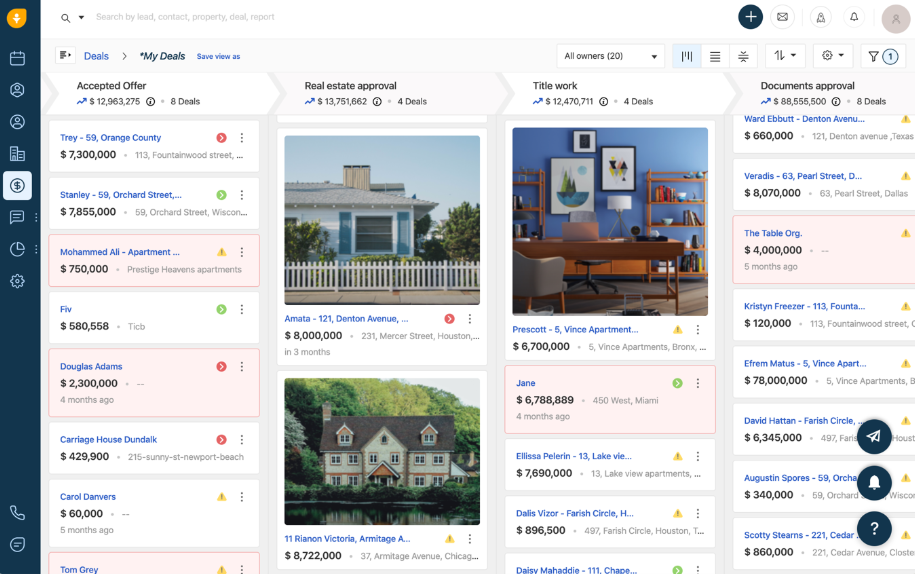
Used alongside with your lead capture forms, communications systems, and marketing tools, you can manage almost every aspect of your real estate agency from a CRM.
A communications platform
Timely, consistent client communication is key to a thriving real estate agency.
That means having a dedicated communication platform that manages to meet your clients’ needs regardless of where they’re reaching out from.
Phone calls. Email. SMS. Video chat.
RingCentral takes care of all of the above and then some, all within a single platform. For example, RingCentral allows you to accept client calls, conduct video conferences, and ultimately go back-and-forth with clients on their terms.
Notably, you can use RingCentral to route your inbound calls so you never miss out on a lead when they reach out around-the-clock. Our platform is also perfect for prospecting and conducting cold-calling campaigns. Thanks to our variety of integrations, you can do so directly from your email inbox or CRM.
Additional features such as SMS allow you to reach clients anywhere and everywhere depending on their preferences.
We’ve seen firsthand how a communications platform can be transformative for our own real estate clients.
For example, ERA Grizzard Real Estate managed to achieve a 98% customer satisfaction score and reduce their spending on phone calls by $40,000 annually using RingCentral.
By allowing agents to move seamlessly from the office to their mobile devices, the increased accessibility results in more business. Agents at RE/MAX experienced similar success after adopting our platform.
From individual agents to real estate giants like Jamestown, speedier communication is crucial. Perhaps Dean Rogers, Senior Support Engineer at Jamestown, puts it best regarding RingCentral:
“Now that we can hop on a video, share screens, review documents and talk through the deal points – rather than waiting for a response to email – we’re able to be much faster on the draw.”
Email and lead capture tools
Building a contact list is a top-priority for real estate agents.
For example, you can put together contact forms that qualify leads based on their location, budgets, and desired properties. This lets you know if someone is a good fit as soon as they reach out. Likewise, you then have their email and essential contact information so you can get in touch immediately.
Over time, you can build a list of contacts and potential referrals that are interested in hearing from you.
Doing all of the above starts with capturing leads and having a dedicated email marketing platform. Tools like GetResponse allow you to create stylish forms for real estate sites…

…as well as customizable email templates with your company’s branding.
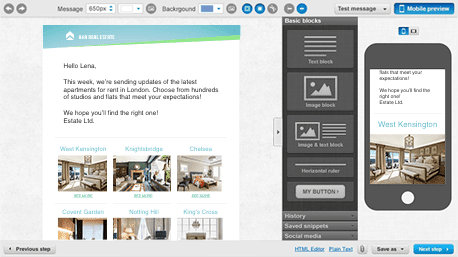
Real estate accounting software
Agents primarily deal with large sums of money in terms of their commissions, highlighting the need for dedicated bookkeeping software rather than tracking expenses in spreadsheets.
Tools like Freshbooks are awesome for real estate agents, allowing you to see at a glance what’s been paid and what’s still outstanding. You can likewise track expenses and quickly export your payments for when tax time rolls around. From invoices to contract templates and beyond, account software ensures that you get paid on time.
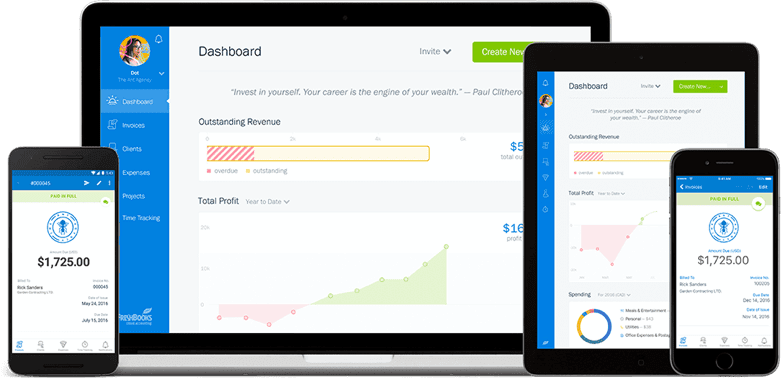
A website builder
As noted earlier, a website is a must-have for a real estate agency.
Let’s say you’re not the most tech-savvy person in the world, though. Don’t sweat it.
There are a variety of real estate web hosting options such as Wix and HostGator which actually boast templates for agency sites. For example, Wix’s real estate templates are clean, professional, and totally customizable. Rather than worry about being a web design guru, their platform lets you put together your site in no time flat.

There are also platforms like Placester which do the legwork of creating and designing your business website and lead capture forms (in addition to managing other back-end tools).

What skills and traits matter most to a real estate agent?
Now that you have an idea of what tools are needed for your real estate agency, let’s talk about your skill set.
Even if you adopt all of the “right” marketing tactics or communication tools, building relationships with clients doesn’t happen by accident. Below are skills to consciously focus on and develop as you begin your real estate journey.
Responsiveness
You should obviously never keep your clients waiting, but speedy response time is crucial for real estate agents.
In short, time is money. From leads reaching out to following up with clients on contracts and the progress towards closing, you quite literally can’t afford to sleep on your phone calls or inbox..
This is again why a dedicated communications tool (like RingCentral!) is so important. The ability to respond in real-time just about anywhere ensures that you’re both responsive and flexible. Coupled with tools such as email templates, you can respond quickly without having to rack your brain with each reply.
Interpersonal skills
No surprises here: successful real estate agents are warm and personable. Becoming comfortable with talking to people is essential to your business. This includes prospecting, small talk, or simply getting to know your clients’ wants and needs. You don’t necessarily need to have a magnetic personality, but you should at the very least make your clients feel welcome.
Empathy
Empathy is a crucial skill for all business owners these days. With so much competition among real estate agents, the ability to understand your clients and make a human connection can help you stand apart from the crowd.
For example, take the time to walk in your clients’ shoes. Think about their pain points and frustrations when it comes to their budgets, what they want in a property, or hesitations that they have toward progressing with a deal.
Having that sense of empathy not only makes your job easier but also helps you figure out how to help your clients make decisions.
Negotiation and persuasion
Negotiating is obviously a huge part of running a real estate agency. Beyond having knowledge of your market, mastering the principles of persuasion such as urgency and reciprocity are game-changers.
For example, you can frame some of your services as “freebies” (think: consultations, client check-ins) to make clients feel like they’re getting a better deal or frame a property as being in high-demand. Learning how to negotiate and persuade people ultimately comes with time and practice.
Organization
Finally, organization is essential for both growing your business and maintaining your sanity.
When you’re juggling contracts, client emails, and other queries, it’s easy to lose track of it all. Unfortunately, getting lost in your inboxes results in wasted time, slower deals, and angry clients.
To bring things full circle with our previous section, it’s important to have the right tools in place to organize your client relationships and consolidate the tools that you’re using. Doing so allows you to automate workflows for your business and turn your client-building process into a well-oiled machine.
Do you have what it takes to start a real estate agency?
Whew! Obviously there are a lot of moving pieces to becoming a real estate agent.These tips and tactics in this guide serve as the building blocks to getting your business off the ground. With some persistence and the right tools (hint: RingCentral), you can get your agency started sooner rather than later.
Originally published Oct 05, 2024, updated Oct 19, 2024




